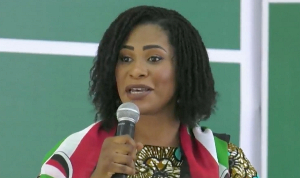The Ghana Education Service has incorporated some contemporary Ghanaian music into the 2024 Basic Education Certificate Examination (BECE). It's very interesting, right?
Of course, this innovative approach has featured musicians Black Sherif and Amerado in the Creative Arts and Design subject.
Students were asked to analyze their works, including their hometown, genre, and contributions to society.
This initiative is commendable, as it promotes critical thinking and appreciation for contemporary Ghanaian music.
Question 5(c) of Section B of the examination reads: "Write short notes on any of the following composers, focusing on his hometown, genre of work, one example of his work, and contribution to society.
Ephraim Amu
Agya Koo Nimo
Black Sherif
While Section A. Question 26: “Select the moral lesson from the lyrics “Mani mmere wo mpaboa no” in the song Kwaku Ananse by Amerado
Do not be envious
Hard work always pays
Be determined
Be assertive
Kudos to the Ghana Education Service for this bold step! This move will undoubtedly inspire students to develop a deeper understanding of music and its impact on society. By analyzing song lyrics, students will learn to critically evaluate the messages conveyed and develop essential skills in media literacy.
However, there's a pressing concern that needs attention. Some musicians incorporate inappropriate and vulgar lyrics into their music, which may have a negative impact on students.
While analyzing song lyrics can help students discern positive and negative messages, making it a part of the syllabus may inadvertently promote harmful content.
The Magic Bullet Theory suggests that media messages can have a direct and powerful influence on audiences, shaping their thoughts, attitudes, and behaviors. This highlights the need for a policy framework to regulate lyrics in music production, ensuring that the content is suitable for students and aligns with societal values.
In conclusion, the inclusion of contemporary Ghanaian music in the BECE is a commendable step towards a more dynamic and culturally relevant education system. However, to fully reap the benefits of the initiative while mitigating risks, a thoughtful and well-structured music policy is essential. Such a
policy would not only safeguard students but also challenge artists to create music that educates, inspires, and uplifts the next generation of Ghanaians.
Opinions of Wednesday, 17 July 2024
Columnist: Samuel Nii Adjetey















